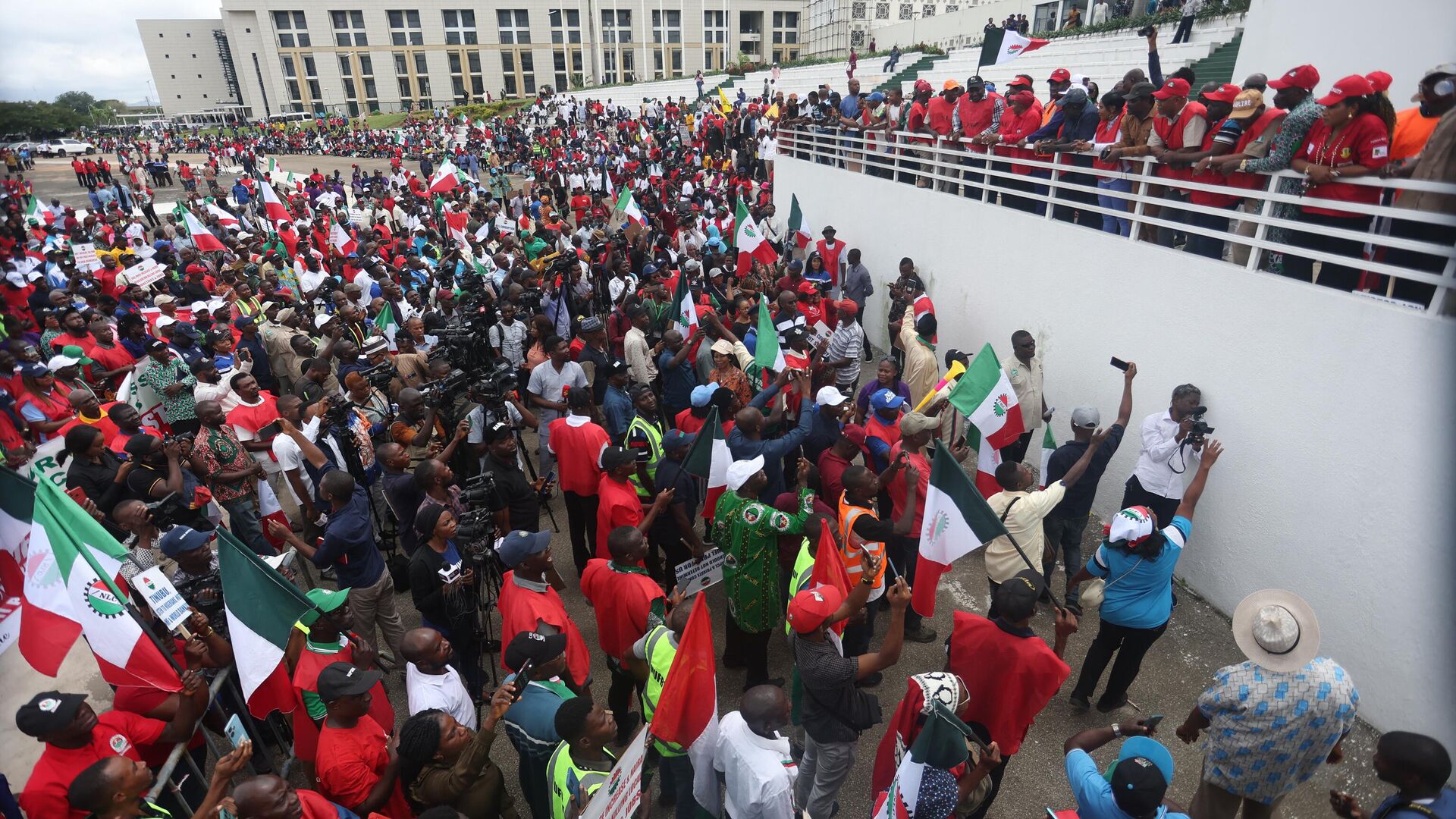Nigerian Workers Still Struggling Despite Recent Financial Aid
09:45 07.10.2023 (Updated: 13:32 10.10.2023)

© AFP 2024 KOLA SULAIMON
Subscribe
MOSCOW (Sputnik) - Since taking office in May, Nigerian President Tinubu has focused on rejuvenating the state's economy after a decade of stagnation. His reforms included eliminating a fuel subsidy that amounted to $10 billion in 2022. The move, which resulted in a substantial increase in cost of living, was largely opposed by labor unions.
Despite Nigerian labor unions securing concessions from the country's President Bola Tinubu, a teacher from a private school in southwestern Nigeria explained to Sputnik that many ordinary workers in the country could not benefit from the promised wage increases and additional efforts were needed to assist vulnerable workers who lived on the edge of poverty.
In his last-minute effort to avoid a national strike called for by several prominent labor unions in the country, Nigerian President Bola Tinubu on Monday agreed to a package of financial concessions that included a short-term wage increase for government workers, a three-month income subsidy for low-income households and a temporary suspension of a value-added tax on diesel.
The promised wage hike for government workers stood at about $45.8 (35,000 Nigerian naira) per month, while the proposed income subsidy for low-income households was $32.9 (25,000 Nigerian naira) per month. According to figures from Nigerian labor unions, the average salary of workers in the country is around $39.5 (30,000 naira) per month. The labor unions are still negotiating with the government to raise the minimum wage to $45.8 (35,000 naira) per month.
The international poverty line defined by the United Nations is $2.15 per day, which is about $64.5 per month.
Unfortunately, millions of Nigerian workers who do not fall under the new financial assistance scheme were forced to continue to endure the economic hardship brought upon by Tinubu’s decision to end the fuel subsidy after taking office in May.
Prices Doubled
As a teacher of mathematics at a private secondary school in the Nigerian southwestern Ogun state, Olanrewaju Ogunkeye had been trying to save enough money for the wedding with his long-time fiancée.
"I have been planning to hold my wedding next month on November 25. We have different cultural diversities in Nigeria. Each tribe demands a different amount for the wedding. No matter which tribe your fiancée is from, the price had gone up. If you needed to spend about $65.9 (50,000 naira) on everything before, you should be prepared to spend at least $131.8 (100,000 naira) now," Ogunkeye told Sputnik.
Similar to labor unions that called upon the national strike, the young teacher also blamed Tinubu’s controversial decision to end the fuel subsidy as the culprit of skyrocketing inflation in the country.
"Since the fuel subsidy was removed, people in Nigeria have been facing all kinds of economic hardship. For example, a bag of rice costs about $65.9 (50,000 naira) today. During the regime of former President Muhammadu Buhari, the same bag of rice was about $45.8 (35,000 naira). The cost of transportation has also doubled. You need at least $0.5 (400 naira) now to cover the same distance that could [previously] be covered with $0.25 (200 naira)," he said.
As part of his efforts to boost economic growth in Nigeria, Tinubu decided to introduce a controversial reform by scrapping the popular but costly government subsidy on fuel.
Tinubu said earlier that the end of fuel subsidy saved the Nigerian government over $1.3 billion (1 trillion naira) in the first two months after it became effective. And the World Bank said in a report in June projecting the Nigerian government to up to $5.1 billion (3.9 trillion naira) this year thanks to the new reform, while warning about short-term inflation pressure.
Unfortunately for ordinary workers like Ogunkeye, they were the ones who had to bear the brunt of the economic hardship caused by the reform.
"As Nigerians from different part of the country, we love each other. But it’s the government that tried to put us under. The government has been the problem in Nigeria, because they enriched themselves day by day while the masses were suffering. While the masses worked hard for the money Nigeria is having, they’re suffering. But why are those who work in the government enjoying everything?" Ogunkeye said.
Compassion Under Economic Hardship
Although Ogunkeye had been working at the secondary school for seven years, his monthly salary still stood at around $52.7 (40,000 naira). But Ogunkeye still considered himself to be one of the lucky ones compared to others who held lower end jobs.
"My sister is working as a secretary and they’re paying her about $39.5 (30,000 naira) per month. But she had to spend at least $0.5 (400 naira) every day on transportation to get to work. As she works six days a week, you can calculate how much she had to spend each week on transportation. That’s $0.5 (400 naira) per day for six days a week. That’s already $3.1 (2,400 naira) per week and $12.6 (9,600 naira) per month. And she also had to pay for rent and for her daily meals," Ogunkeye said.
As no one was immune to the economic hardship brought upon by the reform, many parents were forced to take their children away from the private school where Ogunkeye taught and move them to cheaper public schools.
"Many parents could no longer return their kids to our school, when the new academic semester started recently. In my school, I’ve seen at least five students who did not return for the new semester. When I asked them why, they said that the students decided to relocate and change to other schools that charged less. The public schools in Nigeria are nothing to write home about. One mother told me two weeks ago that she had to change her son from a private school to a public school. She didn’t like that decision, but she had no choice," Ogunkeye said.
According to the young teacher, his school charged about $26.3 (20,000 naira) per month for each student. But this price tag appeared to have become too steep for many families that had been struggling because of the sharp inflation in the country.
Ogunkeye even noticed that more and more people around him began to beg for food.
"In Nigeria, we’re so religious. I’m a Christian. I’ve met some people, even in the church. After service, people would come to me and ask: 'Please, I need some money to eat.' To be able to eat these days, it’s only by God’s grace. This is what’s happening in Nigeria today," he said.
As for the new financial assistance president Tinubu promised to offer, Ogunkeye questioned how many Nigerians could actually benefit from it.
"The government is saying they want to pay government workers $46.1 (35,000 naira) per month for a period of six months. But my question is not everyone is working for the government. Secondly, when the central government send the money to state government to be distributed to people, the state governor would always use the money for something else or divert the money to his own people," he said.
The young teacher suggested that the central government in Nigeria should send the aid money to the bank accounts of Nigerians directly.
As for his personal wedding plan, Ogunkeye faced an uphill battle as he used up almost all of his savings when his mother became sick earlier this year.
"I almost saved enough money for my wedding. But three months ago, my mother became ill. I had to spend a lot of money. That’s what really affected my finances. As I talk to you now, I have only $0.6 (500 naira) left. That’s what’s with me personally, no matter there’ll be a wedding or not. $0.6 (500 naira) is all I have got now," he said.
Nevertheless, when a female colleague, who is a single mother, said that she did not have enough money for food for her son, Ogunkeye gave $0.4 (300 nair) to her at once.
On October 1, Tinubu proposed a temporary minimum wage hike for lower-paid workers, cheap gas-powered public transport and more social security for the poor to help offset the impact of his economic reforms.

